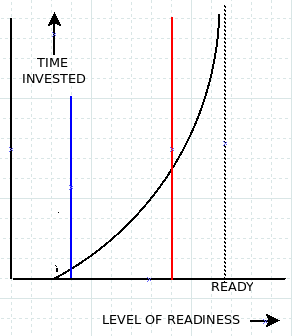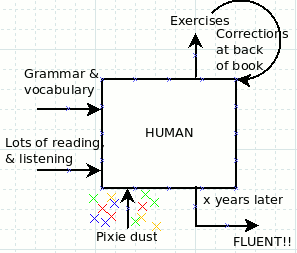The engineering mentality for language learning, being ready & input vs output
For those of you who don't know my background, I have a Bachelor's degree in Electronic Engineering and actually worked as an engineer several times. Perhaps you would think that it's hardly the pre-requisite for becoming a full time language hacker, but I actually feel that my engineering background has been a big contributor for my success with languages.
You see, engineering is a very practical hands-on field. Engineering is built upon scientific principles, but takes them even further into a non-ideal world that is filled with lots of interference that can never be fully covered by equations at a practical level, until an efficient solution to a problem is found.
Engineering isn't about perfection, since the laws of thermodynamics tell us that such a solution is impossible; engineering produces results NOW in the form of machines, technology and constructions.
Because of this, engineering results are always adapting and improving, even though a solution has already been presented. Cell phones get faster and buildings withstand harsh climates better. But if we waited until we had the level of advancement we had now before even actually applying anything, we'd still be living in caves and yelling across hills.
To show you what I mean, let me compare my personal engineering approach to languages compared to what I consider a more traditional approach, using engineering style illustrations while I'm at it!
The ready asymptote
An asymptote is a line or limit which a curve gets closer and closer to but never actually touches. This is how I describe most people's view of when they'll be “ready to speak” as shown below:

The problem with being “ready” is that there is ALWAYS more work to do. There are more obscure words to learn, grammar points and tones to perfect, intonations, cultural differences etc. You will never ever know a language perfectly, so you will never be “ready” if you define ready as “not being able to make any mistakes”.
Aiming for this level of readiness is ludicrous and the result is that most people will never even try to use their language, despite years of study.
It's the same in engineering; heat loss, molecular dispersion, friction and a host of other factors mean that we can never design a perfect system/device. So what we do is to try our best and then accept a “pretty good” solution as the one to apply immediately.
In professional contexts this would be represented by the red line; you have to work hard, but you start to apply it when it's good enough. Waiting until you have it absolutely perfect is wasteful and we would achieve nothing if we did this – aim for pretty good and deliver as soon as possible.
In a system where people's lives are at stake (a bridge's resistance to wind, the accuracy of an aeroplane's sensory detection system etc.), your threshold should be as close as possible to the ideal. But long before you get there, you need to TEST and apply your solution in the field. You simply cannot make a quantum leap from start to next-to-perfect without thorough testing first.
And this is what I do with languages. I set my “ready to speak” threshold much lower, like at the blue line, which is where I'll be after a few short hours of studying.
When I'm trying to communicate in a language, nobody's lives are at stake. If I conjugate my verb wrong or forget some basic vocabulary, the worst that can happen is that someone laughs at my mistake (which almost never happens, since people are way nicer than the pessimists would have you believe). But I can laugh with them and move on, rather than declare it to be the end of the world.
As engineers, the only way we reach that more professional levels of efficiency is by constant testing in real world environments. As a language learner I do the same thing; seeking out tourists, couchsurfers or others to practice with and improve with them. Sure, what I have in my first months is not enough to get me a gig as a guest lecturer at a local university (i.e. professional level), but I can say a lot and even have deep friendships. And thanks to all the practice I improve towards actual fluency quickly.
The ideal stage of speaking really well is a lot closer when you make small steps in that direction by actual use. Expecting all that study to magically produce perfect native-like fluency “some day” without actually using it in the mean time to get closer to it, is nothing short of insanity.
Impossible to start from zero
One other thing you'll notice about the above graph is that at time zero, your readiness level is NOT zero. Perhaps in a theoretical (and pessimistic) system you can approximate everything you know in a foreign language to nothing, but this isn't how it actually is.
There are thousands of words you already know even when you start a brand new language. Even Asian languages have brand names and loan words that will help you initially. And there is a host of non-verbal communication that is essential to being ready to communicate that you ALREADY have.
There is no starting from absolute zero, there's starting from being an adult that can already communicate with human beings. Some people like to think of learning their second language as a baby would be doing, but most of a baby's work is simply reading people in general (expressions, tone and loudness of voice, ways to react socially etc.) – forget language-specific points. And you have most of that already.
Despite the few exceptions of some nodding or finger/arm gestures, the vast majority of non-verbal communication is universal. This is where you are starting from, not zero, and these means of communication are a crucial aspect of any language, even if they aren't listed in your grammar book.
Following a more theoretical approach, as too many language learners do, you'll never get the feedback you need to be able to progress, which brings me on to the next point:
The input vs output fallacy
One thing that has surprised me a lot in reading other blogs related to languages is this supposed “debate” about input vs output. Some of them put me in the “output” camp with my early start to speaking to contrast with their long-term input focused approach.
From a purely theoretical perspective, it may make sense, but in the REAL WORLD (i.e. where us engineers live), it's ridiculous to reduce a system down to be as simple as that, especially one as complex as a social human being.
When you start to look at a system, it make appear to have just one or two inputs/outputs, but engineers know to quickly abandon this oversimplification when it becomes clear how complex systems really are.
The argument goes like this: “You can't produce output without input! You'll make too many mistakes initially and they'll be burned into you forever! Study for a long time (years? decades?) first, and THEN you'll be have what you need to produce output!”
I see people with this argument to visualise “the human learning system” with input as follows:

(I added the pixie dust myself; it's the only way I can see this system as being in any way more realistic).
Without all of that pure input (although you'll note that even in their system pure input is impossible; they need feedback at least from their books), they imagine someone who speaks as soon as possible to be nothing but an output machine full of mistakes.
Someone using the communicative approach to language learning that I promote is nothing like that. In engineering, one of the most important aspects of any system is FEEDBACK.
There is no system that simply involves input in the real world. In biology, mirror neurons, gene regulatory networks, and hormones (among many others) are systems that rely on feedback. In mechanical engineering the float valve is a good example of physical feedback based on the environment (used to regulate fuel in a carburettor, and more familiarly in toilets).
Feedback is essential for an efficient system and you can bet that successful language learners employ it in all stages of their learning cycle.
My view of the language learning system is way too complex to illustrate, but it would have the same arrows going in as this one, then lots of arrows going out (output) in various forms and then coming back from the same source (feedback) for improvement purposes. If the environment isn't giving you feedback on your progress (and no, the answers at the back of the book to your grammar exercises are NOT enough) then you can't make any progress.
That's where people come in, and you can't illustrate a person as a simple feedback loop of corrections. They'll give you encouragement, and the feeling of use with human beings is a great motivation to work towards as you are learning. No simplified A+B=C system can ever represent that.
Be an engineer and get your hands dirty!
In this blog I talk about attitude a lot and push people to change their behaviours. This is because I feel like my experience is allowing me to look at the overall system of speaking a language a lot better. If you look at it as “study grammar+vocabulary + do exercises + listen a lot = be fluent in a few years” you are looking at it with tunnel vision.
I think many people who do try to analyse language learning like this are indeed being somewhat “scientific”. You can do studies, read up a lot about it in advance etc. and feel you will be best prepared. But the real world does not answer directly to our simplified equations, because we cannot realistically factor in all “inputs”.
Being social and lots of practice is my engineering approach to learning languages. It's learning by doing. I'll make mistakes along the way, but the overall approach will constantly get better. Just reading up about how to do it, or investing in courses will never give me that.
It's time to get your hands dirty and tackle languages as an engineer would! Make a plan of action quickly and implement it.



Social